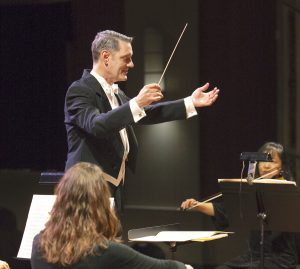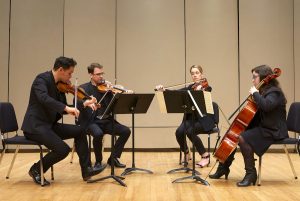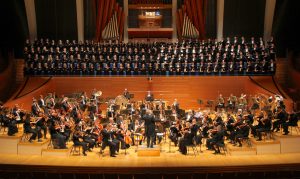For some classical musicians and fans, celebrating Beethoven is a bit like celebrating air: It’s pretty much all around us, all the time. This year, as the world marks the 250th birthday of the most widely admired composer in Western history, many are seeking new perspectives on a man who has long been depicted as grim and furrow-browed but who was in fact one of music’s most complex and multi-faceted personalities.

Bruce Sorrell and the Kansas City Chamber Orchestra have performed all the Beethoven symphonies save one (the Ninth)
Scholars are postulating that Beethoven didn’t take himself as seriously as we might have been taught, and musicians are finding new lightness and humor in his work. Moreover, people struggling with disabilities wonder anew at his perseverance in the face of what we now recognize was total deafness.
“There’s a universality that he embodies better than anyone,” said conductor Bruce Sorrell, who over three decades has led his Kansas City Chamber Orchestra in all but one of the composer’s symphonies and most of the concertos. “Yet it’s hard to understand how he achieved what he did.” Beethoven’s growing deafness very nearly drove him to suicide at around age 30, and much of the subsequent music was composed in utter silence. “There are moments where you feel you have left the realm of what you thought music could convey,” Bruce said of this later music. “It’s as if, 200 years later, it’s hard to write anything more modern.”
Kansas Citians will find no shortage of Beethoven performances this year, beginning with the Kansas City Symphony’s presentation of a large body of the orchestral works and concertos. “Beethoven’s place in our hearts and minds is forever assured,” said Michael Stern, in his 15th season as the Symphony’s music director. “This milestone year allows us to reexamine his music.” The Symphony will cap its 2019-2020 season with a performance of the mighty Ninth, and in November it will presents the Missa Solemnis.

Opus 76 performs the complete Beethoven string quartets in six programs / Photo by Gary Rohman
Local presenters and chamber groups are also offering a great deal of Beethoven, including some of the smaller-scale works. This March 7th at Atonement Lutheran Church, for example, musicians of NAVO Arts (including cellists Mark Gibbs, Hannah Collins, Daniel Veis, Michael Mermagen, and Sunnat Ibrahim) present the complete sonatas and variations for cello and piano.
In August and September, Kansas City’s Opus 76 presents a cycle of the complete string quartets: probably the first time a locally-based group has pulled off such a feat. Hearing all the quartets as a cycle can be transformative, said Bruce, who experienced this recently in Tulsa. “You realize how radical they were.”
There’s no question that Beethoven, having decided in 1802 to “live for his art,” poured his soul into the ensuing quarter-center of creativity. “Disabilities and impairments make things harder, they don’t make things easier,” Keith said: And yet Beethoven “succeeded in a way that’s never been topped.”
Bruce, too, said he believes that Beethoven’s mature outpouring of masterworks was nothing shy of a miracle. “He is writing all of this without hearing it. It’s an astonishing thing, considering the huge, critical impact this music had, music written under these conditions—and not just on Western music but on the Western world.”
TO BEETHOVEN, OR TO ‘NOT-BEETHOVEN’?
Some musicians and scholars are questioning whether we should be paying so much attention to music’s ultimate “deceased European male,” at a time when the world is re-examining the neglected contributions of women, composers of color, and non-Europeans in general. (One resourceful Indiana-based cellist has taken to Twitter with #NotBeethoven, a daily feed of non-traditional works designed to represent the diversity of world music today, one suggestion per day through the entirety of 2020.)

UMKC Conservatory professor Alison DeSimone
Others have suggested that the Western “canon” is merely a reflection of the value system of the people in charge. “I personally love Beethoven’s music,” said Alison DeSimone, assistant professor of musicology at UMKC Conservatory. “But it’s not inherent in his music that it has value: Western culture has ascribed value to the work. And I think it’s really useful … to think about why we did that, and to critique what about this music has made it valuable to Western culture, at the exclusion of other music.”
Beethoven is indeed a great composer who overcame extraordinary odds, she added, and she herself grew up loving the Ninth Symphony as much as the next person (thanks to a classical-loving father, she said).
Yet if there is anything that today’s recognition of the value of world cultures teaches us, is it that “universality” is a relative term. “I can’t speak to the fact that everyone around the world would have the same reaction to the Ninth that I do,” Alison said. One thing is fairly certain: Musicians will be feeling a bit of “Beethoven fatigue” (Ludwigsmüdigkeit) by the time this is all over. “Beethoven’s music is played every year,” Alison said, “even if it’s not an anniversary.”
Some of today’s scholarly explorations of Beethoven have begun to replace the Romantic image of the “defiant genius-tyrant” with one of a middle-class fellow who responded to the needs of his time.

KU professor Martin Nedbal
“He was more than happy to write pieces that were very traditional, sort of mainstream, audience-pleasing works,” said Martin Nedbal, associate professor of musicology at the University of Kansas. “Nowadays we think of him as a more well-rounded person, as opposed to a mythical figure—one who had to deal with real-life issues in the very complicated period in which he lived.”
Performances have begun to reflect this less grandiose view. “There are multiple ways to approach his works,” Martin said. “They are no longer just ‘heroic,’ but they can also be performed in a more personal way.”
There is room for innovation: This year the Philadelphia Orchestra will perform Beethoven’s symphonies and concertos but in juxtaposition with commissions by a broad range of diverse composers, each of whom was asked to write a new work to function “in dialogue” with the Beethoven works on that program. “The framing is what matters the most,” Alison said. “They’re asking, What does the voice of a black female composer say to us, for example, as opposed to that of someone born 250 years ago?”

Kansas City Symphony and Chorus will perform Beethoven’s Ninth Symphony in June / Photo by Eric Williams
But just because Beethoven is a deceased European male “doesn’t mean he hasn’t touched on a lot of issues that have to do with diversity,” Martin said, adding that the figure of Leonore in Beethoven’s opera Fidelio is a pillar of female strength.
“It’s very different music from that of the female heroines in 19th-century opera, who are fragile, or dying, or who get murdered.” Leonore “even vocally is a very different role” that shows Beethoven “engaging with issues that are relevant to us nowadays.”
Genius can transcend boundaries, and great works of art often speak to us in ways we can barely articulate. “What is truly important about Beethoven is that for two centuries people have thought that he is important,” Martin said. “Whether there is an actual ‘essence’ of greatness in his music, this enormous legacy of people constantly talking about him and appreciating him and playing his music is what makes him great.”
A CHAMPION OF THE CHALLENGED
For violinist Keith Stanfield of Opus 76, the critical notion in 2020 is to employ Beethoven’s music to reach the widest range of people possible. The group’s local cycle of quartets this August and September, sponsored by the Sherman Foundation, is being held at a variety of traditional and non-traditional venues, including Morning Glory Ministries (at the Cathedral of the Immaculate Conception), St. Luke’s Hospice, and the Northeast Community Center (through the auspices of Harmony Project KC, an arts-mentoring program).

Beethoven Memorial in Bonn / Photo by Avishai Teicher
The goal is to reach out to underserved and disadvantaged audiences, Keith said, in addition to conventional classical-music fans.
Thus traditional audiences will mingle with Kansas Citians who have perhaps never been to a classical concert. “I wanted to find venues that will get people out to places where they wouldn’t normally go … to demonstrate tangibly that we can bring people together, physical, through music.”
“The whole point of our outreach is to promote social cohesion through classical music. … And what better occasion than the birth-anniversary of someone who had to fight so much adversity?”
Though viewed as a traditional composer today, Beethoven was a social outsider in the early-19th century: a bumpkin from a smallish town whose position as “outcast” was exacerbated by his deafness.

Susanna Phillips is soprano soloist in the Symphony’s Missa Solemnis this fall / Photo by Dario Acosta
“He had a massive disability that should have been career-ending,” Keith said. “And he, famously, nearly killed himself, and then at the last minute decided not to.” As one of the first artists to make a living solely through composing, Beethoven “basically rewrote the rules of his entire society,” Keith said.
And his work is “something that every single person, regardless of his or her musical acumen, can appreciate and understand and be inspired by.”
Or as Maynard Solomon wrote, in his magnificent and oft-cited Beethoven biography, of critiques of the Ninth Symphony’s rosy view of the world:
“If we lose our awareness of the transcendent realms of play, beauty, and brotherhood which are portrayed in the great affirmative works of our culture, if we lose the dream of the Ninth Symphony, there remains no counterpoise against the engulfing terrors of civilization, nothing to set against Auschwitz and Vietnam as a paradigm of humanity’s potentialities. Masterpieces of art are instilled with a surplus of constantly renewable energy—an energy that provides a motive force for changes in the relations between human beings.”
For listings of some of the local Beethoven performances this year, go to kcsymphony.org, opus76.org, kcchamberorchestra.org, hjseries.org, jccc.edu, 1900bldg.com, navoarts.com, among others. To reach Paul Horsley, performing arts editor; send an email to paul@kcindependent.com or find him on Facebook (paul.horsley.501) or Twitter (@phorsleycritic).